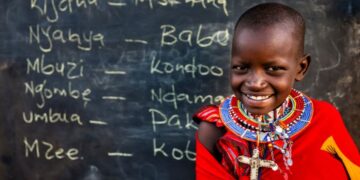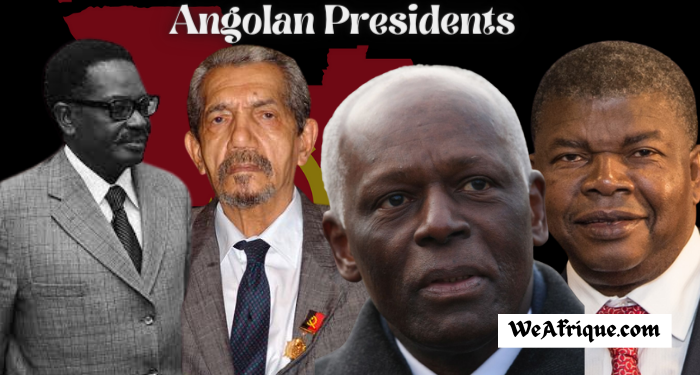Angola’s presidents have guided the nation through important economic, social, and political transitions, enabling it to emerge as a regional model for democracy and growth. Their legacies continue to motivate its citizens and beyond and serve as a reminder to other upcoming leaders who are expected to build on their legacies and take the nation to greater heights.
N’gola, as it was known before the change of name, has been led by visionary presidents. The country’s first leader was Agostinho Neto. He served as the first president of Angola from 1975 to 1979, having led the Popular Movement for the Liberation of Angola (MPLA) in the war for independence.
He was succeeded by an interim president, Lucio Lara, who ruled for only nine days. Jose Eduardo dos Santos took over as president and served from 1979 to 2017. Joao Lourenco has been president since 2018
Meet The Presidents Of Angola From Independence To Date
Agostinho Neto
Born: 1922
Died: 1979 (from pancreatic cancer and hepatitis, aged 56)
Presidential term: 11 November 1975 – 10 September 1979
Neto was born at Ícolo e Bengo, in Bengo Province, Angola, in 1922 to his parents who were both school teachers and Methodist preachers.
After finishing high school, Neto began working in colonial health services before enrolling in medical schools in Coimbra and Lisbon. He mixed his scholastic pursuits with revolutionary politics when he was still in school, which at times put him in danger of arrest and detention.
On the day he received his college degree, he got married to Maria Eugénia da Silva, a 23-year-old Trás-os-Montes-born Portuguese woman before returning to Angola in 1959.
When Angola gained independence in 1975 he became president and held the position until his death in 1979.
According to his sons, President Neto never assigned business or privileges to them, suggesting that despite a controversial presidency he never forgot his humble origins. Moreover, Neto is praised for his several poetic works that have become national anthems in Angola.
Lara Lúcio
Date of Birth: April 9, 1929
Died: February 27, 2016 (aged 86)
Presidential term: Acting president 11 September- 20 September
Born as Lúcio Rodrigo Leite Barreto de Lara on 9 April 1929, Lúcio was a physicist-mathematician, politician, professor, anti-colonial ideologist, and one of the founding members of the Popular Movement for the Liberation of Angola (MPLA).
He studied for a degree in mathematics at the University of Lisbon and during this period he became a resident of the House of Students of the Empire, a student body that served as a center for anti-colonial discussions in Lisbon, Portugal. It was in this discussion center that he became friends with António Agostinho Neto who would later become the the president of Angola.
While participating in political party activities in Lisbon, he met Ruth Pflüger, a young Lisbon-born Portuguese Jew of German ancestry whom he married in 1955. They have 3 biological children, Paulo, Wanda, and Bruno.
Lara was chosen as the Constituent Assembly’s president on the day Angola gained its independence. He enacted the Constitution of Angola on November 10, 1975. In addition, he organized the first official presidential election in Angola, which brought in Agostinho Neto. Lara presided over the legislature until 1977.
Between the passing of Agostinho Neto and the inauguration of José Eduardo dos Santos, he served as interim president of Angola for ten days, from September 10 to September 20, 1979.
Lara faded from public view in 1992 and passed away on February 27, 2016, in the capital of Angola.
José Eduardo dos Santos
Date of Birth: 1922–1979
Presidential term: 21 September- 27 August 1992 and 27 August- 25 September 2017
In what is now Luanda’s Sambizanga district, José Eduardo dos Santos was born on August 28, 1942. His father was a construction worker, while his mother worked as a maid.
He went to primary school in Luanda and finished his secondary education at what is now known as Mutu ya Kevela, formerly known as the Liceu Salvador Correia. Dos Santos began his political career when he joined the MPLA while still a student.
In 1969 he earned degrees in petroleum engineering and radar communications from the Azerbaijan Oil and Chemistry Institute in Baku Azerbaijan, which was the Azerbaijan Soviet Socialist Republic.
Dos Santos made his way back to Angola in 1970, while it was still an overseas province of Portugal. He worked as a radio transmitter in Cabinda Province’s second political-military district during his three years of service in the MPLA’s EPLA guerrilla force, subsequently known as the People’s Armed Forces for the Liberation of Angola (FAPLA), the MPLA’s military wing.
He was elected president of the MPLA on 20 September 1979, and he took office as President of Angola and Commander-in-Chief of the Armed Forces on 21 September. On 9 November 1980, he was also elected President of the People’s Assembly.
Depending on the source, José Eduardo dos Santos had at least two marriages and perhaps as many as four. Also, he had at least 6 children.
Meanwhile, Dos Santos has been accused of running one of the most corrupt governments in Africa with approximately 70% of the population in Angola living on less than $2 per day in his regime.
He is further alleged to have ignored the country’s economic and social necessities in favor of collecting fortune for his family and stifling opposition.
But despite being heavily criticized, he is also praised for the significant part he played in favor of the nation’s independence and his dedication to the promotion of peace and democracy in the nation through negotiations with opposition forces intended to end the civil war.
He died on 8 July 2022, at Teknon Medical Centre in Barcelona, at the age of 79.
See Also: 12 Most Iconic And Greatest African Presidents Ever
João Lourenço
Date of Birth: 5 March 1954
Presidential term: 26th September 2017
João Lourenço was born in 1954 in Luanda, Portuguese Angola.
He studied at the Industrial Institute of Luanda and also joined the MPLA soldiers who were among the first to cross into Angolan territory via Miconage, heading toward the city of Cabinda, in August 1974, as part of the liberation struggle in Ponta Negra.
João Lourenço began his military career fighting against the Portuguese in the Angolan War of Independence and fought as a member of the MPLA in the Angolan Civil War.
His early politics were primarily focused on the MPLA, where he served as an officer charged with maintaining the morale of the guerrilla force. He progressed up the governing party’s ranks after being named Governor of the Moxico Province in 1984. Additionally, he held the positions of first secretary of the MPLA, provincial commissioner of Benguela Province, president of the regional military council of the third military-political region, and provincial commissioner of Moxico Province for the MPLA.
Lourenço was named as the MPLA’s top contender for the 2017 legislative election in December 2016. He was chosen as Angola’s third president on August 23, 2017, and he took office on September 26, making him the nation’s third president overall.
He is married to Ana Afonso Dias Lourenço, and they have six children.




















